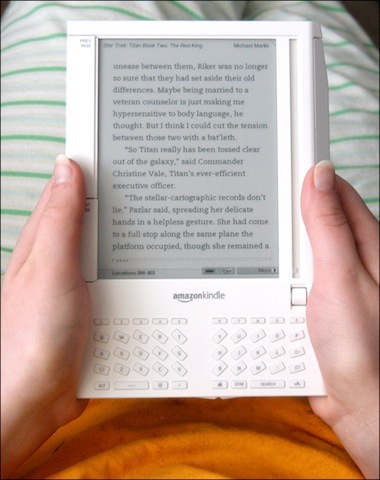Ebooks

Ebooks are a paperless technology with which the majority of us are already familiar. Since their introduction they have slowly but steadily increased in popularity. Today, Ebooks are unquestionably a part of modern life, and the portable devices from which we read them are a paperless answer to novels, magazines, newspapers and textbooks. While there have been many prototypes that failed to take off (e.g. the Rocketbook), new developments are making these lightweight devices more user friendly and cost effective every day. Amazon's current eBook - The Kindle - has sold with great success in US markets and in October 2009 was launched in the UK. Like Apple's hugely successful iPod, The Kindle is integrated with Amazon's own online store. This move towards the complete compatability of paperless technologies helps to encourage the use of electronic resources.
The recently unveiled LG Display solar-powered eBook reader is another example of integrated technology. In this case, solar panels and digital books have been combined, thereby overcoming the issue of battery life while ticking boxes for the environmentally aware.
Advantages
- Convenience of having all our documents on one device.
- Students can have 24-hour access to all required readings.
- With integrate technologies, such as the Amazon Kindle, entire books can be purchased and downloaded in a matter of seconds, saving us both time and money.
- A book in digital format is rendered instantly searchable: a massive advantage in education, but perhaps not so useful when reading for leisure.
- The latest developments in eBook readers allow the user to annotate and highlight the text, as in a conventional textbook.
Disadvantages
- People don't like to read from a brightly lit screen for long periods of time. Research suggests it can strain the eyes, causing longterm eyesight problems.
- Currently, book readers are expensive, with prices from £300. Therefore they are far from universal and also a tempting item to thieves. Some people may be uncomfortable travelling on public transport with such expensive equipment.
- Unlike a throwaway newspaper or magazine, there are some places you would not want to take an eBook reader, because it is an electrical item. The bathroom is a popular example.
- The issue of battery life is important to some people. Your reader could die on you, whereas a novel won't.
- In trials some users have complained that they can not read back their own notes due to typos. When we make a mistake in handwriting it is far easier to grasp the meaning of what was written.
